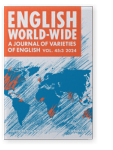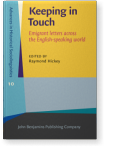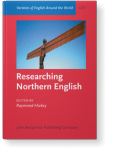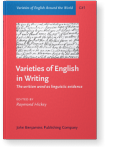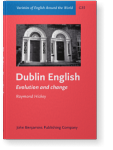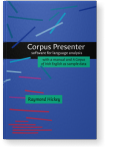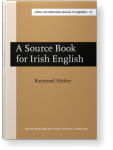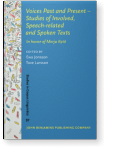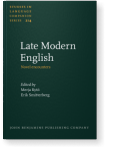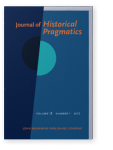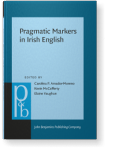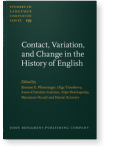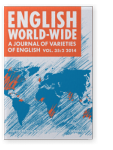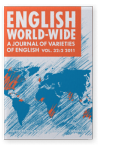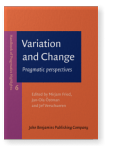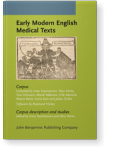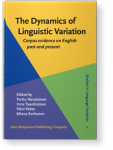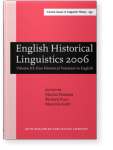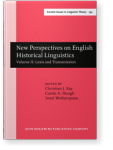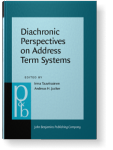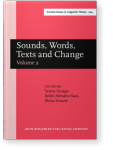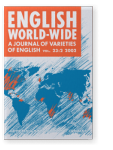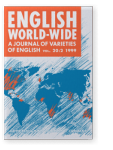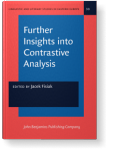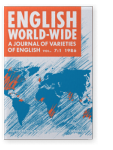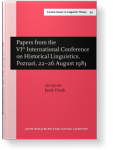Raymond Hickey
List of John Benjamins publications for which Raymond Hickey plays a role.
Journal
Keeping in Touch: Emigrant letters across the English-speaking world
Edited by Raymond Hickey
[Advances in Historical Sociolinguistics, 10] 2019. x, 289 pp.
Subjects English linguistics | Germanic linguistics | Historical linguistics | Sociolinguistics and Dialectology
Researching Northern English
Edited by Raymond Hickey
[Varieties of English Around the World, G55] 2015. x, 483 pp.
Subjects English linguistics | Germanic linguistics | Sociolinguistics and Dialectology | Theoretical linguistics
Varieties of English in Writing: The written word as linguistic evidence
Edited by Raymond Hickey
[Varieties of English Around the World, G41] 2010. x, 378 pp.
Subjects English linguistics | Germanic linguistics | Sociolinguistics and Dialectology | Writing and literacy
Dublin English: Evolution and change
Raymond Hickey
[Varieties of English Around the World, G35] 2005. x, 270 pp. (incl. CD-Rom)
Subjects Electronic/Multimedia Products | English linguistics | Germanic linguistics | Historical linguistics | Sociolinguistics and Dialectology
Corpus Presenter: Software for language analysis. With a manual and A Corpus of Irish English as sample data
Raymond Hickey
[Not in series, 122] 2003. x, 292 pp. (incl. CD-Rom)
Subjects Corpus linguistics | Electronic/Multimedia Products
A Source Book for Irish English
Raymond Hickey
[Library and Information Sources in Linguistics, 27] 2002. xii, 541 pp. (incl. CD-Rom)
Subjects Bibliographies in linguistics | Electronic/Multimedia Products | English linguistics | Germanic linguistics | Historical linguistics | Sociolinguistics and Dialectology
2024 Anyway in Irish English: The development of a pragmatic marker Journal of Historical Pragmatics: Online-First Articles | Article
The development of the pragmatic marker anyway in Irish English is of relatively recent date. From an original adverb of manner there developed a pragmatic meaning when the element shifted to the right periphery (or became exposed there through deletion of an element to the right of it). A… read more
2020 Chapter 11. Sure in Irish English: The diachrony of a pragmatic marker Voices Past and Present - Studies of Involved, Speech-related and Spoken Texts: In honor of Merja Kytö, Jonsson, Ewa and Tove Larsson (eds.), pp. 173–186 | Chapter
The English adjective sure functions in Irish English as a pragmatic marker in sentence-initial or clause-initial position (occasionally in tag questions) expressing intersubjectivity in discourse. This essentially has the effect of affirming shared knowledge among speakers and offering… read more
2020 The interplay of internal and external factors in varieties of English Late Modern English: Novel encounters, Kytö, Merja and Erik Smitterberg (eds.), pp. 43–64 | Chapter
The validity of a division of factors for language change into internal and external forms the focus of the present study. A distinction is made between speaker-internal and speaker-external on the one hand and community-internal and community-external on the other. A central concern is whether… read more
2019 Chapter 8. Grammatical variation in nineteenth-century Irish Australian letters Keeping in Touch: Emigrant letters across the English-speaking world, Hickey, Raymond (ed.), pp. 163–184 | Chapter
A large section of the early settler population in Australia came from Ireland and many of these individuals wrote back home reporting on conditions in the colony and/or advising relatives and friends on emigration. This private correspondence shows a large number features known from present-day… read more
2019 Chapter 1. Mining emigrant correspondence for linguistic insights Keeping in Touch: Emigrant letters across the English-speaking world, Hickey, Raymond (ed.), pp. 1–24 | Chapter
The examination of emigrant letters shows that a judicious exploitation of this material can yield a variety of insights regarding the linguistic structure of varieties at the time of letter writing, despite a number of caveats which must be borne in mind. The diagnostic value of vernacular… read more
2017 The pragmatics of grand in Irish English Journal of Historical Pragmatics 18:1, pp. 82–103 | Article
Over the past two centuries, the use of the adjective grand underwent a specific semantic expansion in Irish English. Apart from the meaning of ‘displaying grandeur’, the adjective came to mean ‘fine’, ‘alright’ and ‘in good form’, both as an expression of the speaker’s situation and as a… read more
2015 The Pragmatics of Irish English and Irish Pragmatic Markers in Irish English, Amador-Moreno, Carolina P., Kevin McCafferty and Elaine Vaughan (eds.), pp. 17–36 | Article
The Irish and English languages are spoken by groups of people who belong to
the same cultural environment, i.e. both are Irish in the overall cultural sense.
This study investigates whether the pragmatics of the Irish language and of Irish
English are identical and, if not, to what extent they are… read more
2015 The North of England and Northern English Researching Northern English, Hickey, Raymond (ed.), pp. 1–24 | Article
Since at least the early Middle English period the conception of the North of England as a region, which is culturally and linguistically separate from the South of the country, has been widespread (Beal 1993: 125–129). Nonetheless, there is no simple consensus about the extent of the North of… read more
2014 Vowels before /r/ in the history of English Contact, Variation, and Change in the History of English, Pfenninger, Simone E., Olga Timofeeva, Anne-Christine Gardner, Alpo Honkapohja, Marianne Hundt and Daniel Schreier (eds.), pp. 95–110 | Article
In the past few centuries vowels before historic /r/ have gone through many changes in different varieties of English, including non-rhotic forms which lost syllable-final /r/ in the eighteenth or early nineteenth centuries. These changes can be grouped into two major types. The first is… read more
2014 Review of Migge & Chiosáin (2012): New Perspectives on Irish English English World-Wide 35:2, pp. 240–245 | Review
2011 Review of Amador-Moreno (2010): An Introduction to Irish English English World-Wide 32:2, pp. 243–245 | Review
2010 Irish English in early modern drama: The birth of a linguistic stereotype Varieties of English in Writing: The written word as linguistic evidence, Hickey, Raymond (ed.), pp. 121–138 | Article
A number of dramatic texts are scrutinised here for the linguistic analysis of Irish English in the early modern period. A broad range of different plays by authors from the late sixteenth to the eighteenth centuries are examined to determine if the non-standard spellings contained in these texts… read more
2010 Language change Variation and Change: Pragmatic perspectives, Fried, Mirjam, Jan-Ola Östman and Jef Verschueren (eds.), pp. 171–202 | Article
2010 Language change Handbook of Pragmatics: 2010 Installment, Östman, Jan-Ola and Jef Verschueren (eds.), pp. 1–38 | Article
2010 Linguistic evaluation of earlier texts Varieties of English in Writing: The written word as linguistic evidence, Hickey, Raymond (ed.), pp. 1–14 | Article
Assessing non-standard texts from previous centuries of necessity involves examining the notion of ‘standard’ which existed before the present. The modern notion of standard English is an eighteenth-century development which builds on formal usage prior to that. The prescriptivism which arose at… read more
2010 Exploring Early Modern English Medical Texts: Manual for EMEMT Presenter Early Modern English Medical Texts: Corpus description and studies, Taavitsainen, Irma and Päivi Pahta (eds.), pp. 219–278 | Article
2008 Feature loss in 19th century Irish English The Dynamics of Linguistic Variation: Corpus evidence on English past and present, Nevalainen, Terttu, Irma Taavitsainen, Päivi Pahta and Minna Korhonen (eds.), pp. 229–243 | Article
The current contribution is concerned with the disappearance of a number of dialect features from the English language in Ireland during the course of the 19th century. At the outset of this century there were many archaic and dialectal features from earlier input varieties of English as well as… read more
2008 Exceptions to sound change and external motivation English Historical Linguistics 2006: Selected papers from the fourteenth International Conference on English Historical Linguistics (ICEHL 14), Bergamo, 21–25 August 2006, Dossena, Marina, Richard Dury and Maurizio Gotti (eds.), pp. 185–194 | Article
This contribution looks at typical changes of sounds and views these as sets of changes the members of which are linked. It also considers the directions of sound changes, considering these as natural pathways (in the case of lenition) or trajectories among vowel movements in which different… read more
2004 Mergers, near-mergers and phonological interpretation New Perspectives on English Historical Linguistics: Selected papers from 12 ICEHL, Glasgow, 21–26 August 2002, Kay, Christian, Carole Hough and Irené Wotherspoon (eds.), pp. 125–137 | Article
2003 15. The German address system: Binary and scalar at once Diachronic Perspectives on Address Term Systems, Taavitsainen, Irma and Andreas H. Jucker (eds.), pp. 401–425 | Article
2003 13. Rectifying a standard deficiency: Second-person pronominal distinction in varieties of English Diachronic Perspectives on Address Term Systems, Taavitsainen, Irma and Andreas H. Jucker (eds.), pp. 343–374 | Article
2003 Language change Handbook of Pragmatics: 2001 Installment, Verschueren, Jef, Jan-Ola Östman, Jan Blommaert † and Chris Bulcaen (eds.), pp. 1–35 | Article
2002 Ebb and flow: A cautionary tale of language change Sounds, Words, Texts and Change: Selected papers from 11 ICEHL, Santiago de Compostela, 7–11 September 2000, Fanego, Teresa, Belén Méndez-Naya and Elena Seoane (eds.), pp. 105–128 | Article
2002 The Atlantic edge: The relationship between Irish English and Newfoundland English English World-Wide 23:2, pp. 283–316 | Article
The intention of the present article is to examine the linguistic features typical of the Irish-derived community in contemporary Newfoundland and to relate these to the varieties of Irish English in the south-east of Ireland, the region from which most of the Irish settlers emigrated in the late… read more
1999 Review of Kallen (1997): Focus on Ireland English World-Wide 20:2, pp. 309–315 | Review
1991 Suprasegmental transfer: on prosodic traces of Irish in Irish English Further Insights into Contrastive Analysis, Fisiak, Jacek (ed.), pp. 219–230 | Article
1986 Possible Phonological Parallels Between Irish and Irish English English World-Wide 7:1, pp. 1–21 | Article
1985 Velar segments in Old English and Old Irish Papers from the VIth International Conference on Historical Linguistics, Poznań, 22–26 August 1983, Fisiak, Jacek (ed.), pp. 267–280 | Article
